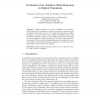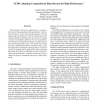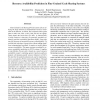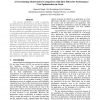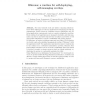115
click to vote
ECAL
2007
Springer
15 years 6 months ago
2007
Springer
Adaptive responses to resource availability are common in natural systems. In this paper we explore one possible evolutionary cause of adaptive sleep/wake behavior. We subjected po...
107
click to vote
IPPS
2000
IEEE
15 years 6 months ago
2000
IEEE
Data-intensive, interactive applications are an important class of metacomputing (Grid) applications. They are characterized by large, time-varying data flows between data provid...
115
click to vote
HPDC
2006
IEEE
15 years 8 months ago
2006
IEEE
Fine-Grained Cycle Sharing (FGCS) systems aim at utilizing the large amount of computational resources available on the Internet. In FGCS, host computers allow guest jobs to utili...
145
click to vote
ECRTS
2006
IEEE
15 years 8 months ago
2006
IEEE
There is an increasing demand to introduce adaptive capabilities in distributed real-time and embedded (DRE) systems that execute in open environments where system operational con...
115
click to vote
GRID
2007
Springer
15 years 8 months ago
2007
Springer
— Currently deployed grids gather together thousands of computational and storage resources for the benefit of a large community of scientists. However, the large scale, the wid...
129
click to vote
SASO
2007
IEEE
15 years 8 months ago
2007
IEEE
Self-adapting systems based on multiple concurrent applications must decide how to allocate scarce resources to applications and how to set the quality parameters of each applicat...
112
click to vote
HPDC
2007
IEEE
15 years 8 months ago
2007
IEEE
The resource availability in Grids is generally unpredictable due to the autonomous and shared nature of the Grid resources and stochastic nature of the workload resulting in a be...
144
click to vote
CSE
2008
IEEE
15 years 8 months ago
2008
IEEE
Ad-hoc Grids are highly heterogeneous and dynamic networks, one of the main challenges of resource allocation in such environments is to find mechanisms which do not rely on the ...
124
click to vote
MIDDLEWARE
2009
Springer
15 years 8 months ago
2009
Springer
Abstract. The trend towards cloud and utility computing infrastructures raises challenges not only for application development, but also for management: diverse resources, changing...
